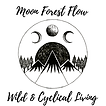Wildness as a Problem to be Solved
As a society we are afraid of wildness and the wildness from which we came is now regarded as an obstacle to be overcome and a problem to be solved.
The flowers and grasses that grow wild and free, no matter how beautiful, are deemed ‘weeds’ to be tamed and trimmed because they do not fit with the socially acceptable, perfectionist vision of what a garden should be.
To let your garden grow wild and free, the way nature intended is regarded as laziness and poor garden management, as letting the street down. But all of this trimming and strimming has left nothing for the bees and we need bees and so now it is socially acceptable to grow a little, tidy, contained patch of wild flowers... because it serves a purpose.
This is how society likes nature (and women! Oh how many parallels there are here). Wild but not too wild, free but not too free, exciting but not dangerous, interesting but not unpredictable. Trees are planted in our gardens and streets for the beauty, protection and nourishment they provide but if they grow ‘too much’ then their growth is halted, they are cut back, made small and their shape perfected.
As a society want to live close to wildness and the majesty of nature without compromising the security of our comfortable modern lives. So we build homes by the ocean and sea defences to hold back her power, we build homes by the rivers and dams to contain her. We want wild animals to continue to exist but we want their land as our own. So we build homes on their land and fences to shut them out and then put them in zoos to preserve them like pickles in a jar. We pat ourselves on the back for conserving these species whose land we have stolen, whose homes we have destroyed.
‘But perhaps nature needs us like a hostage needs her captors: nature needs us not to annihilate her, not to run her over, not to cover her with cement, not to chop her down. We can hardly admire ourselves then, when we stop to accommodate nature’s needs: we are dubious heroes who create a peril and then save its victims, we who rescue the animals and the trees from ourselves.’ ~ Things That Are, Amy Leach
We pour waste into our oceans and landfills, as we pour toxins into our bodies. Out of sight out of mind. And then we are shocked when we come to swim in the oceans we find them empty, shocked when we wake up one day and find we too are empty.
We pull up the plant medicines as weeds and buy medicines over the counter, we are taught to soak up our nutrient rich menstrual blood with toxic sanitary products and buy plant fertilisers that contain the same nutrients. The wild wisdom of plant medicine and offering our blood to the earth long lost and long forgotten for so many.
‘They’ve turned the life blood into a toxic biohazard.’ ~ Uma Dinsmore-Tuli
Having become too many, we have lost the ability or knowing to cooperate with the land and having become too busy we have lost the ability or knowing to cooperate with our bodies. We need wildness but we have forgotten what it is to be truly wild. We seek the meaning of life so far away from nature that we forget that we too were once wild animals, we too have been taken into captivity.
‘Throughout wildlife studies of various species of captive animals, it was found that no matter how lovingly their zoo plazas are constructed, no matter how much their human keepers love them, as indeed they do, the creatures become unable to breed, their appetites for food and rest become skewed, their vital behaviours dwindle to lethargy, sullenness or untoward aggression… Anytime an animal is caged its natural cycles of sleep, mate selection, estrus, grooming, parenting and so forth deteriorate. As the natural cycles are lost, emptiness follows. The emptiness is not full, like the Buddhist concept of sacred void but rather empty like being inside a sealed box with no windows’ ~ Clarissa Pinkola Estes
If we are to begin to heal nature, we must remember the wild in us. We must remember that nature and humans are by definition not separate entities; we are part of nature as much as the trees in the forest and the creatures that inhabit them. We are a species of animal like any other, made of the same compounds as the earth, the wind, the moon and the stars and if we are to heal ourselves and heal nature, we must know this interconnectedness to be true.
As we come to remember our wild heritage, we begin to see that we and not wildness are the problem. We come to remember the wisdom of ebb and flow, activity and rest. We come to honour and celebrate the seasons and cycles of nature, life and our bodies and we come to see how we might work with instead of against nature. As we begin to rewild our bodies, hearts and minds we rediscover hope and begin healing and as we experience healing in our own bodies through rewilding, we see first hand how we might heal the earth in the same way. Taking down fences and dams, reintroducing a little wildness and then stepping back, surrendering to the natural unfolding of life and nature as it was intended. Seeing how life and nature have their own wild wisdom and ways of finding restoration and healing without intervention. Loosening our grip, trusting in wildness.
